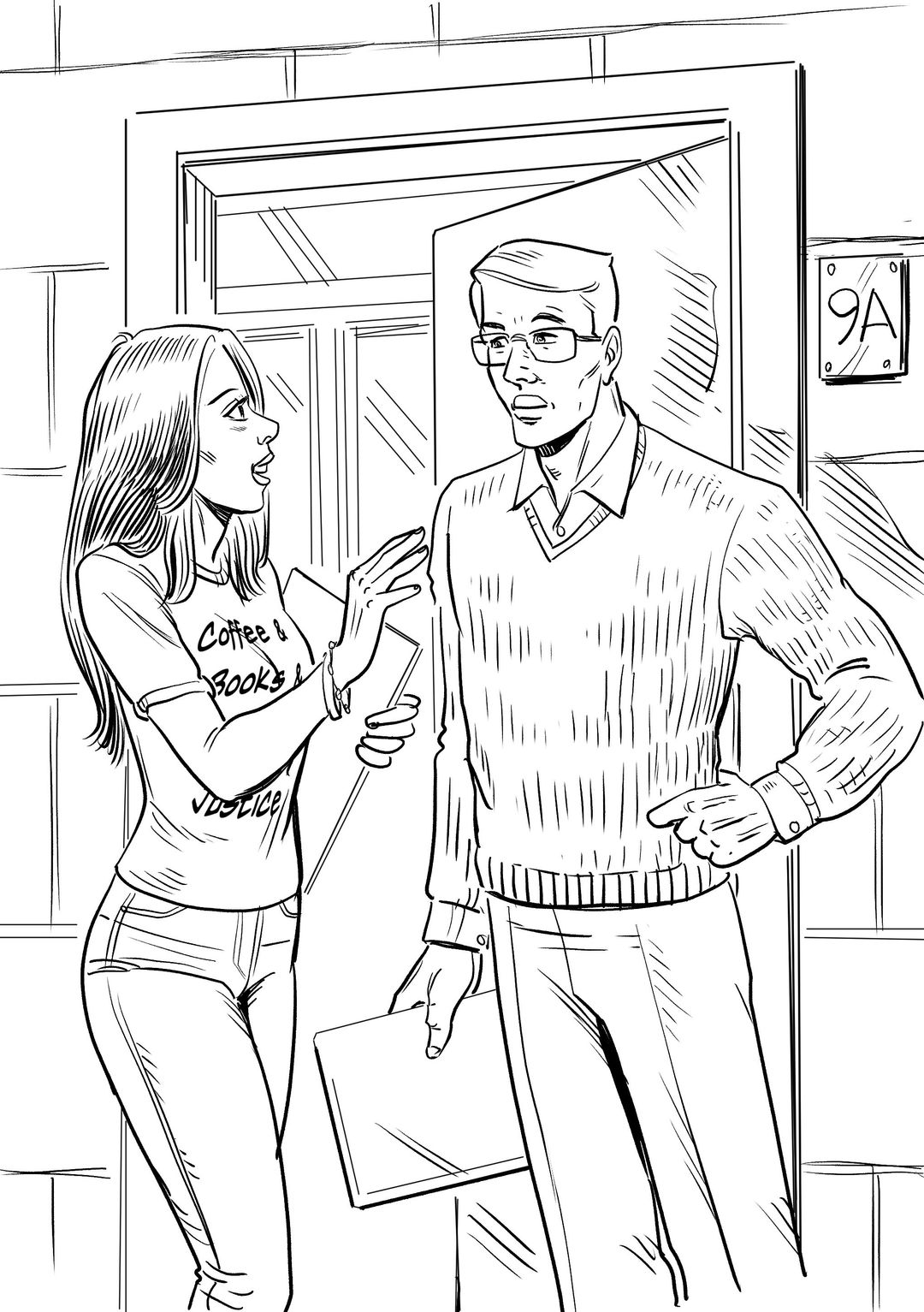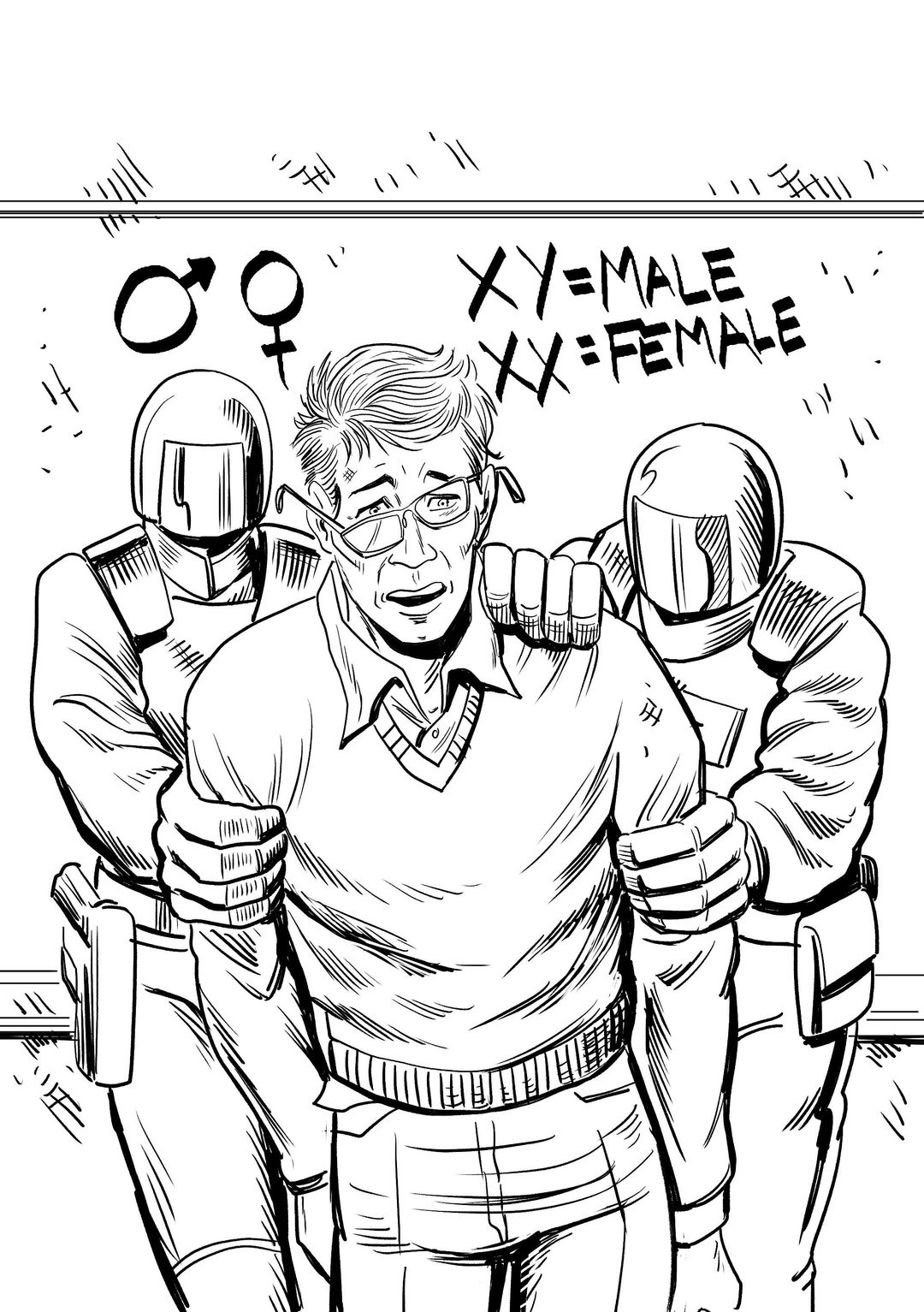
Episode 2: An Educational Misdemeanor
“Hi, Acey,” Dr. Mike Andrews greeted his colleague who was waiting for him outside his classroom door. “Don’t you have a Finite Math class to teach first period?”
“No. They’re off on a field trip. And I just wanted to see you this morning,” Acey twirled a bright blue-tinted curl around her finger, “in case we miss each other for lunch.”
“Yeah,” Mike looked thoughtfully at her. “I suppose that could happen.” He unlocked the door and stepped into his empty classroom with Acey following close behind him. Mike closed the door to ensure their privacy and kissed her. “That’ll have to hold you,” he smiled, “in case I miss you at lunch.” Then he stepped back and shook his head disapprovingly. “That is the most awkward piercing.”
“You don’t like it?” Acey gave him a wicked smile.
“Behave, yourself,” Mike commanded, returning the smile. “It’s going to be a busy day. Last thing I need is a distraction.”
“Oh?” Acey asked innocently. “Busier than usual?”
“Looking like it,” Mike answered vaguely.
Acey took a different tack. “Aren’t you tired of teaching high school students? Aren’t you ready to move on in your career and become a professor at a university?”
“That’s just not going to happen,” Mike shook his head disdainfully. “They all require diversity, equity, and inclusion plans. I can’t lie well enough to get past that hurdle, nor do I want to.”
“Why would you have to lie? What’s wrong with diversity?” Acey took a step back. “It’s just common decency, acceptance, and respect for others. It’s social justice.”
“If you have to modify the word, you’re changing the meaning,” Mike countered. “Justice is treating people fairly, according to their due. ‘Social justice’ is treating some people better or worse based on group identity.”

Acey and Mike.
“There are historic wrongs that need to be addressed instead of being swept under the carpet,” Acey continued piously. “You need…”
“What we need is to not waste our time going over this yet again,” Mike interrupted. “I have a busy day ahead of me. We’re not going to get any further than the last time we tried to discuss it. I think for myself. I have my own opinions. And I want to be free to express them as I will.”
“That is one thing your guys got right,” Acey conceded. “That Pepe meme thing with the gray faced automatons merely parroting back their program? Too many people just repeat back slogans without understanding them or thinking them through.”
“Pepe?” Mike frowned. “That’s the frog cartoon character. I think you mean Wojack. The NPC meme.”
“NPC?” Acey asked.
“Non-Player Character,” Mike explained. “The bots in online games with a limited set of responses and actions programmed into them. Most people are like that. Never questioning. Never thinking. Never willing to consider if they’re wrong.”
“Exactly!” Acey’s face lit up. “I can talk to you, and it’s like there’s actually someone there. Even if you do reach the wrong conclusions on so many issues. You at least think about it.”
“I could say the same of you, you know,” Mike replied.
“Opposites attract, I suppose,” Acey shrugged her shoulders and smiled.
“Only in physics,” Mike grinned, reaching his hand under her long hair to hold the back of her neck. “I prefer biology.” He pulled her close for another kiss.
After a long moment, Acey pulled back and opened her eyes to look at Mike. “So if you’re always willing to question whether you’re wrong, why can’t you understand that academic freedom isn’t an absolute? Sometimes you have to be willing to give in just a little bit not to hurt peoples’ feelings.”
“No one cared about hurting MY feelings when I got cancelled from Twitter and Facebook and LinkedIn for pointing out the inconsistencies in the COVID narrative and speaking my mind about vaccine safety. I’ve been blacklisted. No university in the country will take me, even if I wanted to ‘give in’ and try to play their game. Which I don’t. I’m lucky I found this job here.”
Just then, the door opened, and students began filing into class. Mike stepped back from Acey.
“Good morning, Dr. Andrews!” one of them greeted him.
“Good morning, Harry!” Mike welcomed his student.
“Hi Ms. Buchmann!” another greeted Acey.
“Hi, Sue,” Acey nodded an acknowledgement to the student, looked a bit flustered and continued, lowering her voice. “You have to go along to get along, Mike. If you weren’t so stubborn, if you were willing to be reasonable, to give in, just a little bit, you might find the path to academia opened to you. Maybe even here.”
“Your mother would never be able to tolerate a ‘wrong-thinker’ like me on her faculty,” Mike countered.
“My mother sees a lot of potential in you,” Acey replied. She paused a moment, looking knowingly into his eyes. “See you around.”
Mike frowned at the cryptic remark and watched her leave. He noticed Acey swing wide to go down the far aisle between the columns of desks. Acey placed a hand on Sue Morgan’s shoulder. His student smiled back at Acey.
Whatever.
It was showtime.
Mike took a deep breath, gathered up his notes, and fortified himself with a sip of coffee.
The bell rang.
“Good morning, class. Settle down, everyone,” Mike called the class to attention. “Today, we’re going to review some material we discussed last month.”
Some faces appeared through the glass of the door, unnoticed by the class. Mike saw the superintendent standing in the hallway.
“This morning, we’re going to review one of the most fundamental aspects of biology,” Mike spoke loudly to be sure the watchers in the hallway would be able to hear him. “We’ll be discussing the science behind sex.”
There was an awkward murmuring in the classroom, as he recaptured his student’s attention.
“What is ‘asexual reproduction?’” Mike wrote on the chalk board.
“Not getting any!” came a voice from the back of the room.
“Raise your hand if you want to share your particular subject-matter expertise,” Mike admonished his student. He pointed to another student with a raised hand.
“It’s reproduction of an exact copy of an organism,” came the answer.
“Good. Now asexual reproduction is far more common than – the other kind, so we’ll start by considering it. The process of cellular division is called?”
A half dozen hands shot up.
Mike pointed to one.
“Mitosis?” his student answered.
“MITOSIS,” Mike wrote on the board.
“When a cell divides, it makes an exact copy of the… things in the nucleus? The things that determine the genetic makeup of…”
“DNA!” interrupted a student.
“Raise your hand and wait to be called upon,” Mike admonished his student. “DNA.” He wrote it out on the chalk board. “Deoxyribonucleic Acid. That’s the chemical associated with these things, but what’s the more general name for the structure that contains the DNA?”
He selected one of the raised hands.
“Chromosomes!”
“That’s right.” Mike added “CHROMOSOMES” to his vocabulary list.
“So in asexual reproduction, a cell undergoes mitosis, and – assuming there isn’t an error in the transcription – we get two exact copies of the original cell, each of which has an exact copy of the chromosomes.” Mike noticed a raised hand. “Question, Sue?”
“What if there IS an error?” the student asked.
“And what’s the name for that kind of error,” Mike asked, “when there’s some kind of change in the genetic code?”
“Mutation,” a number of students answered without waiting to be called upon. Mike didn’t bother admonishing them.
“Usually, it’s a minor problem without much effect,” Mike explained. “If a mutation does have an effect, it usually makes an organism less fit. On rare occasion, mutations may make an organism more fit. But the process of mitosis has to be pretty darn accurate or the descendent cell lines would get their genomes more and more scrambled as time went on. The cell lines would be less and less fit.”
Mike looked around the classroom.
“If only there were a different kind of reproduction. A kind of reproduction that would somehow merge and combine the genetic material from two fit organisms into a descendent with a different mix of their composite genetic background. What’s that called?”
He pointed to a student.
“Sexual reproduction,” came the answer.
“SEXUAL REPRODUCTION,” Mike added the term to his vocabulary list. “In sexual reproduction specialized cells called gametes,” he wrote “GAMETES” on the board, “each with half the number of chromosomes of a regular cell, fuse together. Gametes come from a special kind of cell division, called?”
He pointed at a student’s upraised hand.
“Mitosis?”
“Close! But that’s the normal process of cellular division. This is a special process that splits up the chromosomes leaving the gamete with half the chromosomes.”
Mike selected another hand.
“Meiosis?”
“Correct.” He wrote “MEIOSIS” on the board.
“Now there are two distinct kinds of gametes: a larger kind, associated with females called?”
“Eggs,” came the consensus answer. A smart aleck in the back called out “ovum.”
“EGGS… or ova, plural, ovum, singular,” Mike confirmed. “And there’s a smaller kind associated with males…”
“Sperm!” volunteered an enthusiastic student.
“SPERM,” Mike agreed, writing out the term.
“In human reproduction, each cell usually contains 46 chromosomes: 23 pairs, except for the gametes which only have 23 chromosomes,” Mike continued, writing out the numbers on the board. “Now, there are a variety of sex-determination systems we observe in nature. There’s the ‘ZW system’ we see in birds, reptiles, and some insects. There’s the ‘haplo-diploid sex-determination system.’ But in humans and most other mammals, we use the ‘XY sex determination system.’ The FEMALE,” he wrote on the board, “has two of the same kind of sex chromosome: XX,” he added beside “FEMALE” on the board. “The MALE has two different kinds: XY,” he added to the board. The mother’s female gametes always contribute an X chromosome. The father’s male gametes contribute either an X OR a Y chromosome. If the fertilized ovum ends up with XX, it becomes female. If it gets XY, it becomes male.”
Sue Morgan raised her hand.
Mike observed she had her cell phone out and had it pointed in his direction. “Yes, Sue,” Mike pointed at her.
“Dr. Andrews, don’t hormones influence sex, too? Like how the pill prevents periods and pregnancy?”
“Yes,” Mike acknowledged. “But, hormonal contraceptives, ‘birth control pills,’ are a form of steroidal endocrine disrupting chemicals. They prevent pregnancy by short circuiting a woman’s normal endocrine system and tricking her body into thinking she’s constantly pregnant. They have significant downsides, however: increased risk of cervical and breast cancer, weight gain, lowered fertility, and because they flatline production of oxytocin they damage pair-bonding behavior. Messing with hormones has consequences.”
“But can’t hormones help people designated female at birth to become more masculine?” Sue asked. “Or people designated as male at birth to become more feminine?”
“Yes,” Mike confirmed, “that’s true. Women who take testosterone may experience male pattern baldness, increased muscle mass, and an end to their periods. Men who take estrogen lose muscle mass and may start growing breasts. But hormones merely amplify or attenuate existing secondary sexual characteristics. Hormones cannot change your sex.”
“Are you saying that biology trumps… free will and personal choice?” Sue asked. “That if you’re born XX you have to be female, and if you’re born XY, you have to be male?”
“Sex is not strictly binary,” Mike explained. “There are some ambiguities: ‘intersex’ situations with rare chromosome combinations like only X, or XXY, or XYY. Rarely, some people end up ‘chimeras’ with a mix of XX and XY cells. And there can be situations in which secondary sexual characteristics don’t align perfectly with chromosomal sex. An XY male in utero may be exposed to female hormones from an XX female twin or vice versa. And those hormones can have an influence on secondary sex characteristics. The biology can get complicated.”
Mike took another sip from his mug to collect his thoughts and make sure his next words came out precisely as he’d rehearsed.
“People are similarly complicated, and we don’t always understand why some are inclined to identify with a gender other than their biological sex. But from the perspective of biological science, sex is determined by your chromosomes. With very few exceptions, XY chromosomes mean you are male, and XX chromosomes mean you are female.”
“Yes, Sue,” Mike acknowledged her upraised hand.
“What if my chromosomes say I’m XX,” she asked, aiming her phone right at him, “but in my heart I feel like a male. Am I still female?”
“From the perspective of biological science,” Mike carefully qualified his answer, “yes.”
Just then, the door burst open with a resounding crash.
A surprised Mike dropped his coffee and took a step back.
Glass tinkled and shattered as it hit the ground.
A startled girl shrieked.
Others recoiled, pushing aside desks and knocking books onto the floor.
Sue calmly filmed the tumult.
Four men clad in black SWAT uniforms rushed forward, grabbed Dr. Andrews and bent him over the desk.
“I think we’ve heard enough!” The superintendent exclaimed from the back of the room. “Dr. Andrews, you are in violation of the GAIA Act. Officers? Arrest that man and remove him from this classroom!”
The officers continued patting down Dr. Andrews.
“What!” exclaimed a student.
“You can’t do that!” shouted another.
“He did nothing wrong!”
“What’s going on?”
Confused noises filled the classroom.
“I have the situation under control,” the superintendent declared. “Students, take your seats.”
The officers efficiently patted down Dr. Andrews, and cuffed his hands behind his back.
“Ms. Buchmann,” the superintendent called out into the hallway. “Would you please take over here?” Acey entered the class.
“You have the right to remain silent,” the officers began, leading Mike out of the classroom. Mike’s eyes met Acey’s as he passed her. How convenient she’d been standing by just outside. And her encouragement of Sue just before class? Acey averted her eyes and continued to the front of the class as the officer led Mike behind the superintendent and out the door.































































